How to Create Effective Email Templates for Shopify

Email templates are a game-changer for Shopify store owners. At Drop Cowboy, we’ve seen firsthand how well-crafted email templates can boost engagement, save time, and drive sales.
In this post, we’ll show you how to create effective email templates for Shopify that will take your marketing efforts to new heights. Get ready to learn the key elements and best practices that will make your emails stand out in crowded inboxes.
Why Email Templates Matter for Shopify Stores
Email templates stand as the backbone of e-commerce success. They transform customer relationships and boost bottom lines for Shopify stores across the board.
Supercharge Customer Engagement
Email templates don’t just look good – they deliver results. A study by Omnisend revealed that segmented email campaigns increase revenue by 760% compared to generic campaigns. Tailored templates for different customer segments don’t just send emails; they initiate conversations that truly resonate with your audience.
Build Trust Through Consistency
In e-commerce’s fast-paced world, consistency can make or break your brand. Email templates ensure every message reinforces your brand identity. This consistency builds trust, and trust translates to sales. Lucidpress reports that consistent brand presentation across all platforms can increase revenue by up to 23%.
Reclaim Precious Time
For Shopify store owners, time equals money. Email templates act as your secret weapon to reclaim valuable hours. Instead of starting from scratch for each campaign, you can focus on optimizing your message. This efficiency allows more frequent customer communication without exhausting your marketing team.
Boost Conversions (and Your Bottom Line)
Let’s talk numbers. The Direct Marketing Association reports that email marketing yields an average ROI of $42 for every $1 spent (a whopping 4,200% return!). To achieve these results, you need emails that convert. Well-designed templates with clear calls-to-action and persuasive copy significantly increase your click-through rates and, ultimately, your sales.
Seamless Integration with Shopify
Email templates integrate smoothly with Shopify’s ecosystem. This integration allows you to automate order confirmations, abandoned cart reminders, and personalized product recommendations. The result? A cohesive customer experience that drives engagement and sales.

Email templates don’t just enhance your Shopify store – they revolutionize your marketing strategy. As we move forward, we’ll explore the key elements that make these templates truly effective. Get ready to unlock the full potential of your email marketing campaigns!
What Makes Shopify Email Templates Effective?
Creating email templates that drive results for your Shopify store requires more than just aesthetics. It demands crafting messages that resonate with your audience and inspire action. Let’s explore the key elements that set successful email templates apart.
Subject Lines That Grab Attention
Your subject line acts as the gatekeeper of your email’s success. A study by Invesp reveals that 47% of email recipients open an email based on the subject line alone. To maximize impact:
- Keep it short (under 50 characters)
- Use power words
- Create a sense of urgency
For example, “Last chance: 24-hour flash sale starts now!” will likely grab more attention than a generic “Newsletter update.”
Personalization Beyond First Names
Personalization increases open rates by 26% (Campaign Monitor). But it extends far beyond using {{first_name}}. Try to:
- Leverage Shopify’s data to segment your audience
- Tailor content based on purchase history, browsing behavior, and customer lifecycle stage
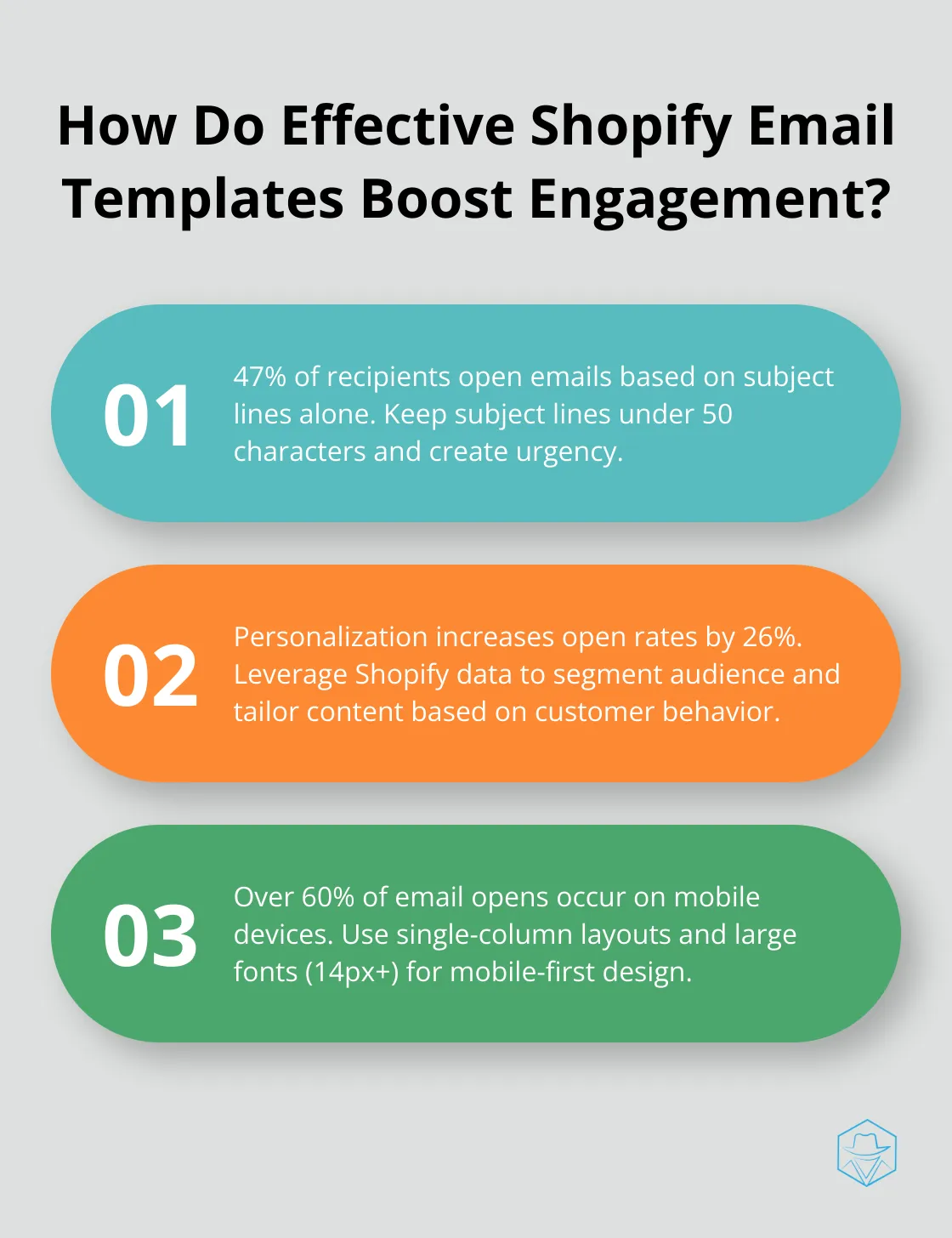
A returning customer might receive an email showcasing new arrivals in categories they’ve previously purchased from, while a first-time buyer could get a welcome series introducing your brand story.
Mobile-First Design
Over 60% of email opens occur on mobile devices (Litmus). This statistic underscores the importance of flawless mobile design. To achieve this:
- Use a single-column layout
- Opt for large fonts (at least 14px for body text)
- Include thumb-friendly buttons (minimum 44×44 pixels)
Test your templates across various devices and email clients to ensure a consistent experience.
CTAs That Convert
Your call-to-action (CTA) serves as the focal point for conversion. Make it stand out with:
- Contrasting colors
- Actionable language
Instead of “Click here,” try “Shop now” or “Get your 20% off.” Hubspot found that personalized CTAs convert 202% better than default versions. Consider using dynamic CTAs that change based on the recipient’s profile or behavior.
Brand Consistency That Builds Trust
Every email should feel like a natural extension of your Shopify store. To achieve this:
- Use your brand colors, fonts, and tone of voice consistently
- Include your logo prominently
- Maintain a similar layout across different email types
This consistency helps build brand recognition and trust, which prove crucial for driving repeat purchases.
As we move forward, we’ll explore best practices for implementing these elements in your Shopify email templates. You’ll learn how to use Shopify’s built-in tools, incorporate dynamic content, and optimize your templates for maximum impact.
How to Craft Winning Shopify Email Templates
Creating effective email templates for your Shopify store requires strategy, not just design. We’ll explore the best practices to elevate your email marketing approach.
Leverage Shopify’s Native Tools
Shopify’s built-in email editor offers drag-and-drop functionality, allowing you to design professional-looking emails without coding knowledge. Start with Shopify’s pre-built templates and customize them to match your brand. This approach saves time and ensures your emails integrate seamlessly with your store’s data.
Personalization is Key
Generic emails don’t cut it anymore. Use Shopify’s liquid variables to dynamically insert customer-specific information. This goes beyond just using a customer’s name. Include product recommendations based on past purchases, or reference their browsing history. For example, if a customer frequently buys skincare products, your email could highlight new arrivals in that category.
Test, Analyze, Improve
A/B testing optimizes your email performance. Test different subject lines, layouts, and CTAs. Shopify’s analytics provide valuable insights into open rates, click-through rates, and conversions. Use this data to continually refine your templates. Some businesses increase their email revenue by up to 30% through consistent testing and optimization.
Design for All Devices
With over 60% of emails opened on mobile devices, responsive design is non-negotiable. Shopify’s templates are mobile-responsive by default, but always preview and test your emails on multiple devices. Pay special attention to image sizes, button placement, and text readability on smaller screens.
Boost Engagement with Social Proof
Incorporate user-generated content and reviews into your email templates. This social proof can significantly boost credibility and conversions. Try adding a section that showcases recent positive reviews or features user-submitted photos of your products in action.
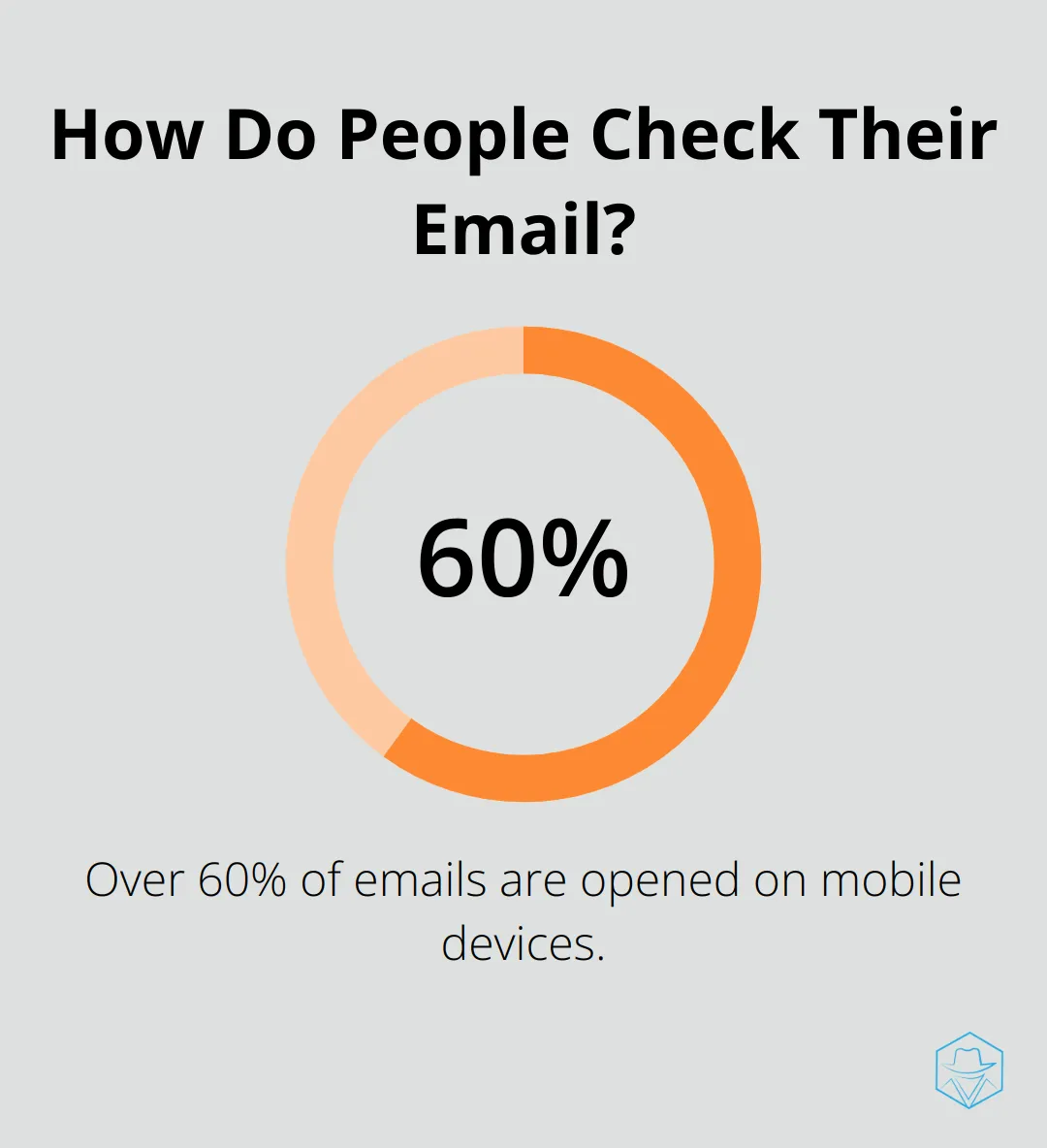
The timing of your emails can greatly impact their effectiveness. Use Shopify’s scheduling features to send emails at optimal times. Studies show that Tuesdays and Thursdays tend to have higher open rates (but this can vary by industry). Experiment with different send times and analyze the results to find what works best for your audience.
These strategies will help you create email templates that not only look great but also drive real results for your Shopify store. Effective email marketing requires ongoing refinement and optimization.
Final Thoughts
Effective email templates for Shopify stores drive engagement, build trust, and boost sales. You must test different elements, analyze metrics, and refine your approach to create campaigns that resonate with your audience. The e-commerce landscape evolves rapidly, so your email marketing strategy needs to adapt to new trends and customer preferences.
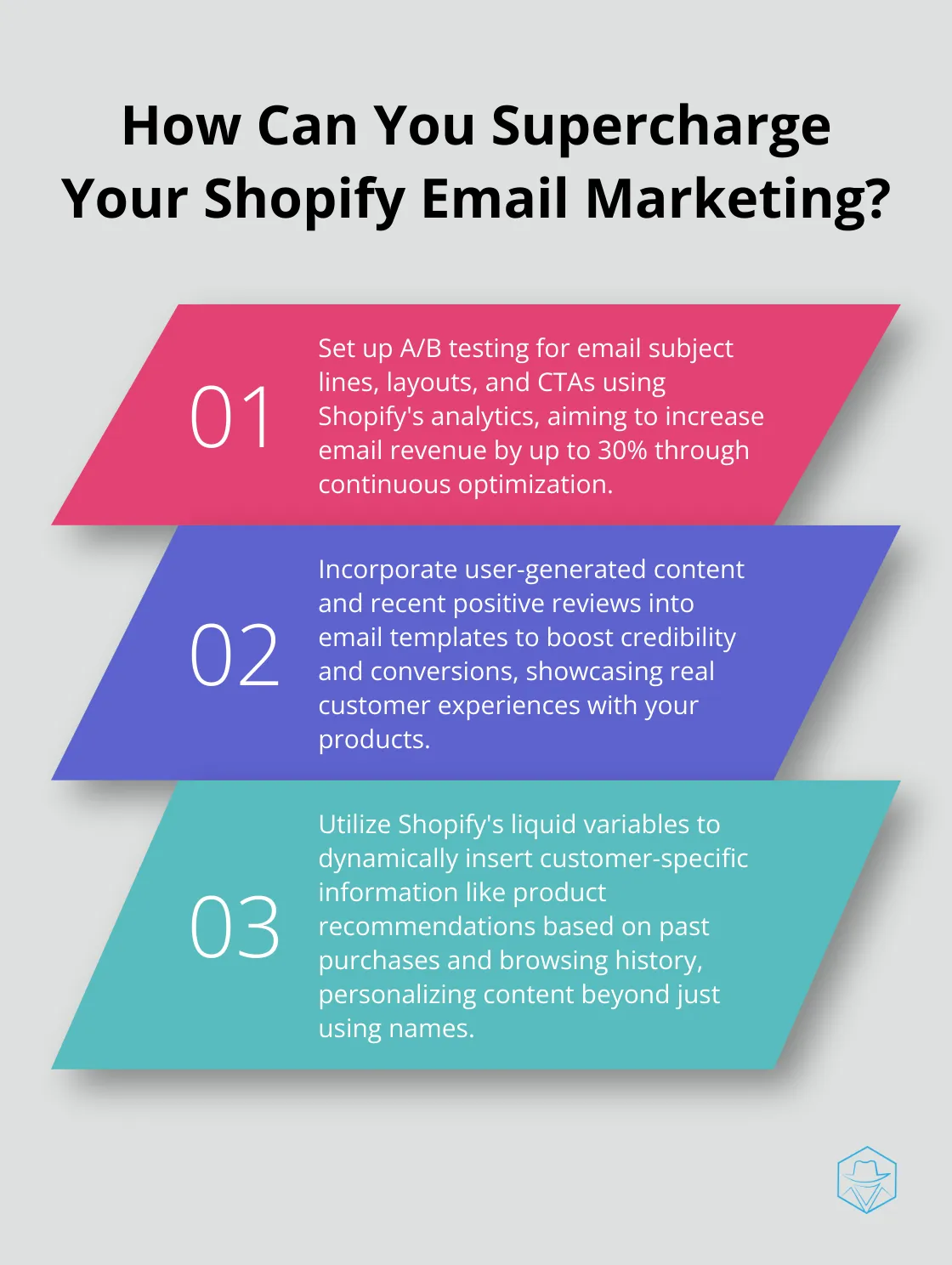
Tools like Drop Cowboy can complement your email marketing efforts and amplify your message across multiple channels. You should review your current Shopify email templates, identify areas for improvement, and implement best practices to see a significant impact on customer engagement and sales figures. Your future success depends on the effort you invest in optimizing your email templates today.
Take action now to improve your Shopify email templates. This process requires persistence and a data-driven approach, but the results will justify your efforts. Start by analyzing your current templates and making small, incremental changes (based on the strategies we’ve discussed) to enhance their effectiveness.
blog-dropcowboy-com
Related posts

April 17, 2025
Streamline Your Marketing Content with Automation
Streamline marketing content automation, boost productivity, and engage your audience effortlessly with cutting-edge tools and practical insights.

March 22, 2025
Top iPaaS Tools for Seamless Data Integration
Explore top iPaaS tools for seamless data integration. Discover efficient solutions for enhancing connectivity and streamlining your business processes.

April 17, 2025
Essential Shopify Apps for Successful Dropshipping
Discover the best Shopify apps for dropshipping to boost efficiency, streamline operations, and enhance customer experience effortlessly.

April 8, 2025
Marketing Automation Classes: What to Expect
Explore what a marketing automation class offers. Gain practical skills and knowledge to enhance your marketing strategy effectively.
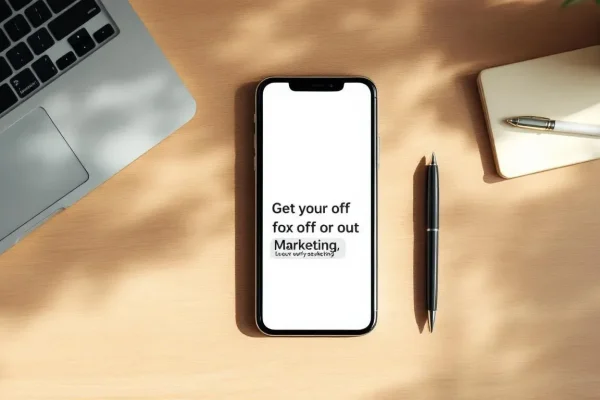
March 1, 2025
Text Marketing Examples That Drive Results
Explore text marketing examples that boost engagement and deliver results with proven strategies for increasing conversions effectively.
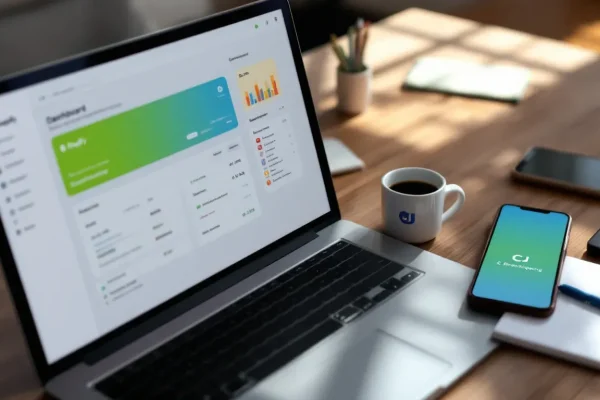
April 14, 2025
How to Integrate CJ Dropshipping with Shopify
Integrate CJ Dropshipping with Shopify easily and boost your e-commerce success. Get practical tips and seamless solutions for your online store today.